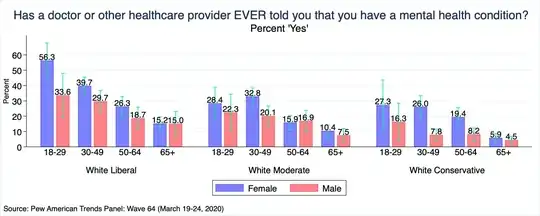Not based on this evidence.
Your first source claims "A 2020 Pew Research study reveals that over half of white, liberal women have been diagnosed with a mental health condition at some point." The author bases this not a Pew document itself, but on a Twitter thread by political science graduate student Zach Goldberg, who describes himself as a "Wokeness Studies scholar".
The source in question is a Pew Research Center American Trends Panel (ATP) survey conducted March 19 to March 24, 2020, in the early weeks of the covid-19 pandemic "to understand how Americans are continuing to respond to the coronavirus outbreak." This isn't a random telephone survey, but a Pew effort to track changes among a generally static, broadly representative group of participants. Each year the participants are sent survey questions; this year 11,537 people from the pool responded via web surveys or the wireless tablets they were provided.
Several questions asked directly about the developing pandemic, such as how closely the respondent had been following the news, whether they had prayed about the outbreak, and what they thought the government should do in response.
The last question was "Has a doctor or other healthcare provider EVER told you that you have a mental health condition?" According to Pew, 18% of respondents indicated "yes."
From the associated data you can slice and dice the results to identify how various population groups answered the question: Men vs. women, rich vs. poor, and, indeed, conservative vs. liberal. In his number-crunching, Zach Goldberg mostly focuses on white liberals vs. white conservatives, though he points to a large gap between liberal women 18-29 and liberal men 18-29. (Though overall numbers are lower, there are similar gaps between white conservative women and white conservative men.)

However, what this doesn't do is establish "mental illness" among the respondents. It establishes whether they're willing to say they were told by a healthcare provider they had a mental health condition" -- however the respondent interprets "healthcare provider" and "mental health condition." It doesn't say "diagnosed." It can be affected by whether the respondent has access to health care, is willing or unwilling to seek counseling, or does or doesn't have someone willing to talk to them about depression, an eating disorder, a substance abuse disorder, PTSD, or any of a variety of other issues. These are also factors that can vary by whether someone lives in a rural area versus a city.
Goldberg, whose Twitter thread sparked this discussion, acknowledges this: " "It's possible that the disparities in self-reported diagnosis are simply or partly a function of white liberals being more likely to seek mental health evaluations. I don't have the data to answer this question." He later notes "...this is a question that's underexplored and which may shed light on attitudinal differences towards various social policies."
Another element is that this survey result, even if we accept it as telling us something about the circumstances of women based on their political leanings, doesn't tell us anything about causality or currency. The question doesn't ask, and the answer doesn't tell us, whether the respondent was currently experiencing a mental health issue, just whether they had ever been told they had a "mental health condition."
We also don't know how the respondents interpreted "mental health condition" as applying to themselves; the Diagnostic and Statistical Manual of Mental Disorders (DSM–5) counts not only depression and schizophrenia as conditions, but also autism, stuttering, and attention deficit hyperactivity disorder.
